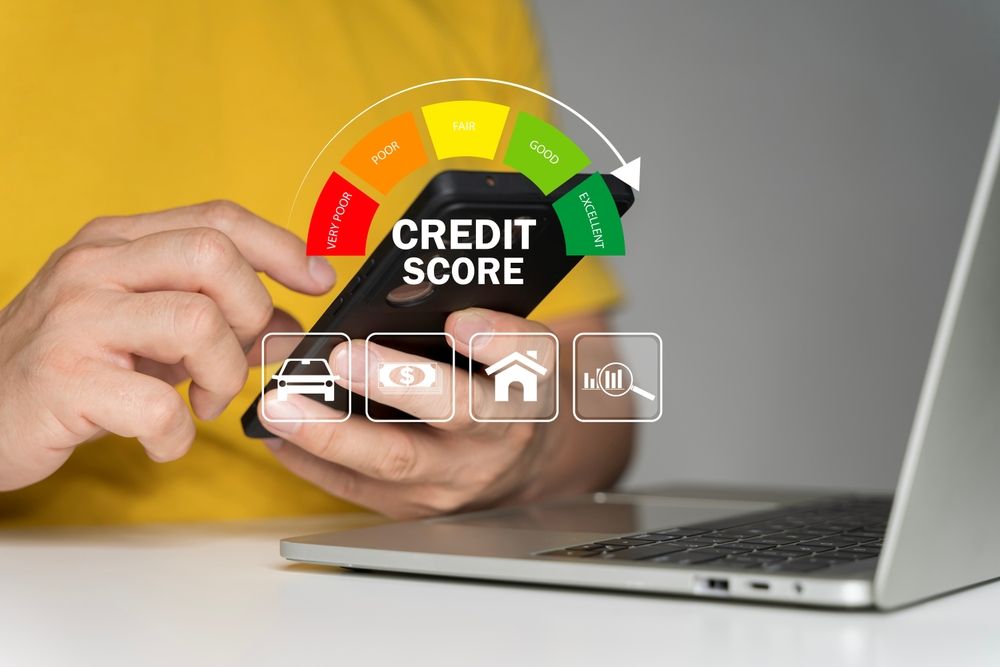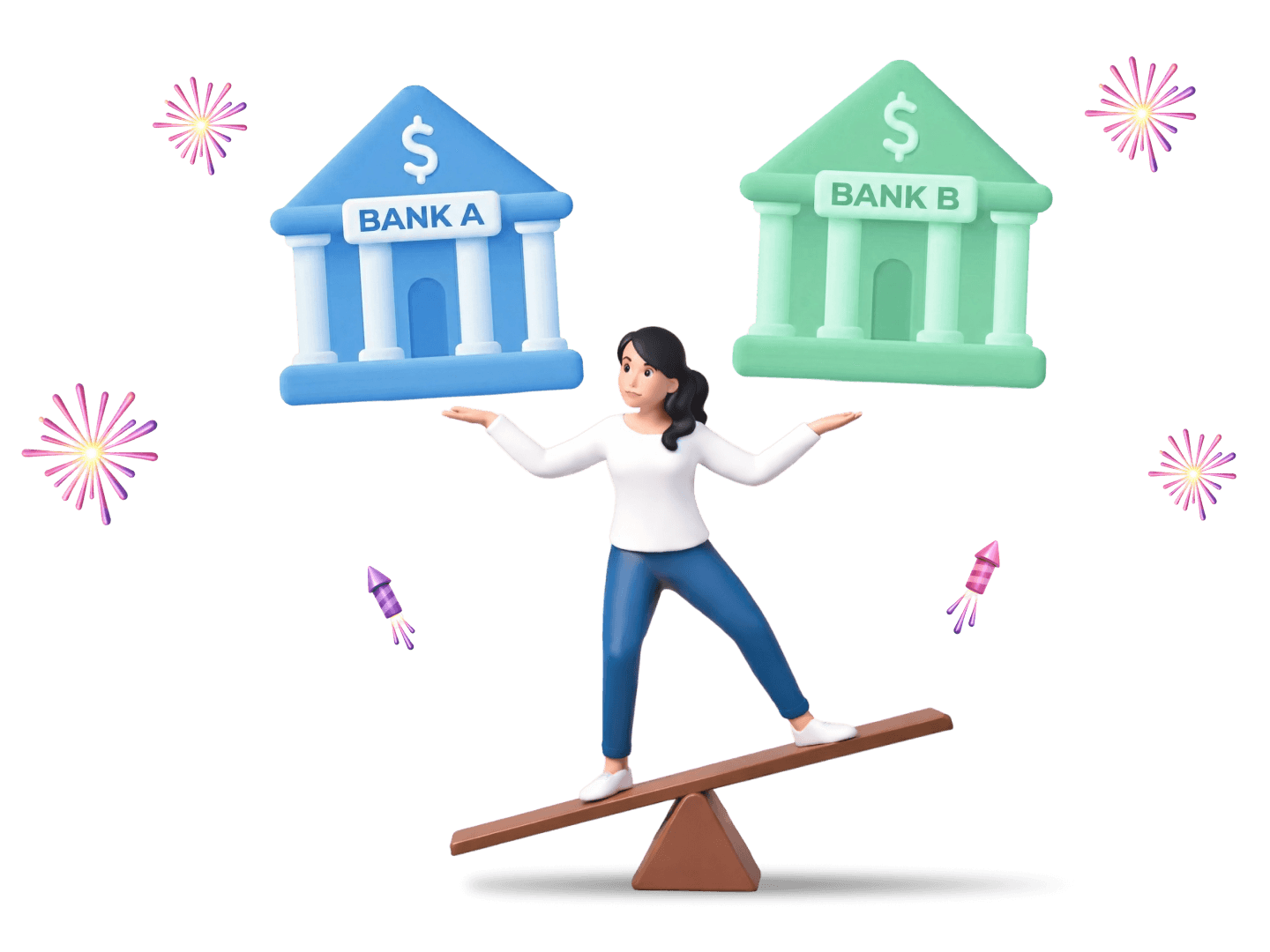How to Build Credit Score in Singapore
Updated: 11 Dec 2025

For most loans above $500 (most banks and financial Institutions don't check your credit grade for loans of $500 or below) banks will use your credit score to determine your loan quantum or how much they are willing to lend you. Unlike some other countries, banks in Singapore seldom vary the interest rate based on your credit grade – if you have bad credit, you will instead be given a smaller loan or outrightly rejected.
This is why it’s important to keep your credit score healthy. The worse it is, the less you can borrow for a car, house, education or starting a business – you get the picture. In some cases, a prospective employer may also ask to see your credit score when you apply for a job. Some employers (particularly in the finance industry) will turn down applicants with bad credit.
But don't worry, building a good credit score isn't as daunting as it seems. Let's explore some proven strategies to boost your creditworthiness and unlock a world of financial opportunities.
How to build credit with a credit card
Using a credit card responsibly is a powerful way to start building credit in Singapore. When managed effectively, a credit card allows you to make purchases, pay your balance in full each month, and establish a consistent history of on-time payments, which lenders highly value.
However, it's essential to use credit cards cautiously. Overspending or missing payments can lead to debt and damage your credit score. Always strive to keep your credit utilisation low and make at least the minimum payment on time, every time.
Want to know your credit score?
We'll show you how to check it for free! Learn about the credit reporting agencies in Singapore and access the resources you need to get your credit score without any cost.
Try a secured credit card
For those who are new to credit or have a less-than-ideal credit history, a secured credit card can be a valuable tool. These cards require a cash deposit, which acts as collateral and typically sets your credit limit. This deposit also helps establish a record of responsible repayment. Ensure that the secured credit card you choose reports to the Credit Bureau of Singapore (CBS), as this is crucial for building your credit history within the Singaporean context.
>> Learn more about secured credit cards in SIngapore.
✨Get the Reward Upgrade You Deserve✨
Get your dream Apple, Dyson, Sony, or Nintendo gadgets when you apply for select Citi, HSBC, OCBC, or Standard Chartered credit cards via SingSaver and top up as low as S$60! Valid till 1 March 2026. T&Cs apply.
SingSaver CNY 2026 Flash Deal
Get an extra S$68 eCapitaVoucher on top of your reward! 🧧 For a limited time only, the first 8 eligible applicants at 2pm and 8pm daily will score this bonus when applying with Citi, HSBC or OCBC credit cards. Valid till 26 February 2026. T&Cs apply.
How to build credit without a credit card
While credit cards are a common tool for building credit, there are alternative methods available.
Explore alternative credit-building products
personal loan, you borrow a fixed amount of money and repay it in monthly instalments over a set period. The lender reports your loan and repayment activity to the Credit Bureau of Singapore (CBS).
Consistent, on-time repayments demonstrate responsible borrowing behaviour and contribute to a positive credit history. Be sure to choose a licensed moneylender with transparent fees and reasonable interest rates, and only borrow what you need and can comfortably repay.
Use a co-signer
If you're having trouble getting approved for a loan on your own, a co-signer can help. A co-signer is someone with a good credit history who agrees to share responsibility for your loan. With a co-signer, you may increase your chances of loan approval and potentially access lower interest rates or borrow a larger amount.
However, it's important to remember that the co-signer is legally responsible for repaying the loan if you default, and defaulting will damage both your and the co-signer's credit score. Co-signing is a serious commitment, so have an open and honest conversation with your potential co-signer about the risks involved.
Consider a secured loan
A secured loan is a loan that is backed by collateral, such as a savings account or fixed deposit. This makes it less risky for the lender, which can make it easier to get approved, even if you have limited credit history. As you make regular payments on the secured loan, your positive payment activity is reported to the CBS, helping you build credit over time.
Important Note: Secured loans typically have lower interest rates than unsecured loans, but you risk losing your collateral if you default on the loan.
>> Read more: Best Loans for Bad Credit in Singapore
SingSaver Personal Loans Cashback Offer
Enjoy interest rates as low as 1.08% p.a. (EIR from 2.09% p.a.) and up to S$1,900 in cashback when you apply for a personal loan via SingSaver. Valid till 1 March 2026. T&Cs apply.
Build a positive payment history with recurring bills
Even if you don't have a credit card or loan, you can still demonstrate responsible financial behaviour by consistently paying your recurring bills on time. This includes utilities like electricity and water, telecommunications bills, and subscription services. While these payments may not be directly reported to the CBS in the same way as credit card or loan payments, they still contribute to your overall financial picture.
Lenders often consider your bill payment history as an indicator of your financial responsibility. A consistent track record of on-time payments can strengthen your creditworthiness and increase your chances of getting approved for credit in the future.
>> Read more: Best Credit Cards for Paying Utility Bills
Practise good credit habits
Always repay loans on time
By the time you receive a second or third letter reminding you of late payment, your credit score will have dropped. This will happen whether or not the bank waives lay payment fines.
For credit cards, always repay at least the minimum sum, before the billing cycle ends. At SingSaver, we recommend that credit card bills be repaid in full every month in order to save on interest repayments.
For loans such as mortgages or personal instalment loans, inform your bank early if you think you may miss payments. Alternatively, speak to a credit counsellor. It is possible that the bank will work out a repayment scheme (debt restructuring), which will do less damage to your credit rating.
Avoid multiple loan enquiries in quick succession
If you make four or five loan applications within a short span (e.g. a single month) of time, you could be identified as 'credit hungry'. This is typical behaviour for someone in financial difficulty, such as someone who has just been retrenched or is in debt.
Spread out your loan applications whenever possible. If you're trying to find a cheaper loan, use the comparison tools on SingSaver to compare offers with the lowest interest rate. Don't apply for multiple loans and enquiries all at once.
Limit your number of open credit facilities
In general, avoid having more than four to five credit facilities (personal lines of credit, credit cards, personal loans, and so forth). At any rate, holding six or seven credit cards or credit lines is not advisable. You will likely get confused by the various billing cycles and miss payments.
Always close off credit cards you no longer use, which will also save you paying the annual fee. For personal lines of credit, there is little reason to have more than one. If you find a credit line with a lower interest rate, close your current credit line and switch to the cheaper one.
Never default on loans
If you default on a loan, it will appear on your credit report indefinitely. A single major default can make it impossible ever to get a credit card, line of credit, or home loan. If you cannot make repayment, always seek credit counselling and have your debt restructured. While it will lower your credit grade, it is better than defaulting.
In addition, defaulting will result in legal action if you have the money but refuse to make repayment.
Meet short-term loan repayments to repair damaged credit
If you have a bad credit grade, the easiest way to repair it is by settling in full any short-term or small loans ($1,000 or less). Over time, this will go a long way to repairing your damaged credit once the bureau sees you are making repayments on time and in full.
If you currently have a credit grade of B or under, start doing this a year or two before you apply for major loans, such as a home loan. This could bring you the coveted AA rating by the time you send in your application.
⚡SingSaver x UOB One Credit Card Flash Deal⚡
Get up to S$888 Cash via PayNow or 55,000 MaxMiles by HeyMax (worth S$990) (enough for a round trip to Europe (e.g. Paris, Rome, Madrid) when you apply for a UOB One Credit and make a minimum spend of S$800 within the first month of card approval. Valid till 28 February 2026. T&Cs apply.
Check your credit scores and reports
Regularly monitoring your credit scores and reports is vital for tracking your credit-building progress.
Credit reports
In Singapore, your credit report provides a detailed history of your credit usage. It includes information on your payment history, outstanding debts, and credit inquiries. Reviewing your credit report regularly allows you to identify and correct any errors that may be negatively impacting your score.
Credit scores
Your credit score in Singapore is determined by a proprietary algorithm that tracks your use of credit.
Credit Score Risk Grades in Singapore
|
Rating |
Score |
Probability of Default |
|
AA |
1911 – 2000 |
between <= 0.27% |
|
BB |
1844 – 1910 |
between 0.27% to 0.67% |
|
CC |
1825 – 1843 |
between 0.67% to 0.88% |
|
DD |
1813 – 1824 |
between 0.88% to 1.03% |
|
EE |
1782 – 1812 |
between 1.03% to 1.58% |
|
FF |
1755 – 1781 |
between 1.58% to 2.28% |
|
GG |
1724 – 1754 |
between 2.28% to 3.48% |
|
HH |
1000 – 1723 |
between >= 3.48% |
Source: Credit Bureau Singapore
The highest possible credit score risk grade is AA. Grades of B or C indicate delinquency or late repayments, and grades of D or lower are often caused by defaults (bank was forced to write off the loan).
Non-Scored Risk Grades
|
HX |
Public Record (with or without inquiry / with or without trade). This means there could be a past and/or existing writ of summons/bankruptcy record filed against you. |
|
HZ |
Currently 90 + / write off with outstanding balance greater than or equals to $300. An HZ risk grade is accorded when you have outstanding balances >=$300 and have accounts loaded in any of the following status: D: 90 or more days past due F: closed with outstanding balance H: involuntary closure with outstanding/surrender of security with outstanding balance R: closed, restructured loan S: closed, negotiated settlement prior to charge off W: closed as default record by Member. |
|
GX |
Inquiry record only (no Public Records / No Trades). This means there is only self-enquiries and/or enquiries made by banks when there is no credit file. |
|
BX |
Only inactive trade, “Other”, Bridging Loan, or Margin Trading account present. This means either all your accounts are closed (with or without balance) or you only have bridging loan or margin trading account or accounts that are loaded as ‘Others’ by your lender. |
|
CX |
Insufficient Credit Activity. This means there is ‘very limited’ information such as Credit Applications and/or Accounts Status History as such, unable to derive a Score. |
In addition to the credit grades, there are some "ungraded" credit scores. If you have no history of using loans or credit cards, you will have an ungraded score of "Cx". Persons currently declared bankrupt or facing litigation may also lack a credit grade (their credit report will indicate their situation).
Want to know your credit score?
We'll show you how to check it for free! Learn about the credit reporting agencies in Singapore and access the resources you need to get your credit score without any cost.
Frequently asked questions about building credit score in Singapore
Building good credit involves responsible habits and consistent financial behaviour. Always pay your bills on time, including credit cards, loans, and utilities. Keep your credit utilisation low – aim to use no more than 30% of your available credit. Maintain credit accounts in good standing to build a long credit history, and diversify your credit mix with different types of credit.
While building credit takes time, some strategies can accelerate the process. Consider a secured credit card, which requires a security deposit that becomes your credit limit. Pay down existing debt to improve your credit utilisation ratio. If possible, become an authorised user on a responsible account with a long and positive history.
Young people can start building credit by opening a student credit card, taking out a small loan and repaying it responsibly, or using a secured credit card. Getting a part-time job and building a steady income also demonstrates financial stability.


